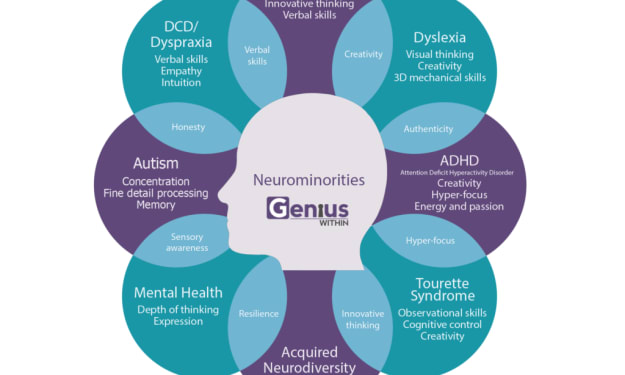Dyspraxia and my 'Musa'
What does Dyspraxia mean to me?
Hello :) above is a video of Musa from Fate: The Winx Saga. I will explain how this relates later. My name is Amber Forest. Some of you know me as Chloe, a member of a group called Dyspraxia Dialogues based in Norfolk. Please check them out on Facebook! If you have been following my stories, it will be no secret that I have a developmental difference called dyspraxia or 'Developmental Co-ordination Disorder.' For those who do not know what that is, I am going to create my own definition later because this one is misleading:
'Developmental co-ordination disorder (DCD), also known as dyspraxia, is a condition affecting physical co-ordination.'
Whilst this is not untrue, this leads people to think that dyspraxia only affects co-ordination. What happened to the 'developmental' aspect of Developmental Co-ordination Disorder? The NHS website expands on this slightly:
'Developmental co-ordination disorder (DCD) can cause a wide range of problems.'
Here they get to the meat of it:
Symptoms of dyspraxia can vary between individuals and may change over time. You may find routine tasks difficult.
If you have dyspraxia it may affect:
your co-ordination, balance and movement
how you learn new skills, think, and remember information at work and home
your daily living skills, such as dressing or preparing meals
your ability to write, type, draw and grasp small objects
how you function in social situations
how you deal with your emotions
time management, planning and personal organisation skills
NHS are on point with this one but we still need to integrate EVERY aspect of dyspraxia into the shorter definition. NHS also acknowledge the possible overlaps with other developmental differences:
If you have dyspraxia, you may also have other conditions, such as:
attention deficit hyperactivity disorder (ADHD)
dyslexia
autism spectrum disorder
difficulty learning or understanding maths (dyscalculia)
depression or anxiety
This brings me to my own definition of what dyspraxia means to me:
'A developmental difference in which the brain is slower processing information thereby resulting in challenges with multitasking, speech, co-ordination, sensory overload, fatigue, emotional regulation and picking up on social cues.'
A shorter version I once used with a friend was:
'It means the brain is slower to process things, do more than two things at once and that I have what are considered autistic traits but I'm not autistic.'
This encompasses far more about dyspraxia than a google definition ever could but at the risk of almost answering my own question, maybe the large variation in how dyspraxia affects people is why the definition is limited. Still, I think we can do better than 'a condition affecting co-ordination.'

No other person's definition of dyspraxia will be the same as mine. There are different levels and types of dyspraxia. I have Developmental Verbal Disorder/verbal dyspraxia which means that my speech is slower and that I have trouble pronouncing certain sounds. Not everyone's dyspraxia will affect their speech.
My next point is the varying difficulties in co-ordination. I read about a dyspraxic who accidentally broke entire dinner sets. Luckily, I am not prone to breaking dinner sets. I was never good at team sports at school. I know two dyspraxics who play football and dyspraxic who is very good at crocheting. At school I struggled with textiles. What I excelled in was English, especially story writing!
Driving…. I really tried but (and my instructor said it) unless I can show that I am able to pay attention to what is going on around me as well as drive the car then I will never be able to drive on my own, unless I have someone in the car with me. Yes, I did try learning in an automatic and had different instructors. I have the same issue riding a bike... I would always feel ashamed or alone whenever anyone commented on my choosing not to drive. Until I met some dyspraxics who also had tried and felt that they could not do it. Like me, it was the trouble with directions and the multi-tasking. Even someone who had passed their test explained that they would only stick to local routes and would have to plan the route before going out in the car. However, I have read about some dyspraxics who actually enjoy driving. So whatever choice we make, please do not pressure us.

Finally... personalities :) this is my favourite part because it is what makes us unique. You will have noticed that I have mentioned having what are considered 'autistic traits' without being autistic. This, as I have been told by two pyschiatrists and one therapist, is because my dyspraxia happens to overlap with some autistic traits. For some people, their dyspraxia will not overlap with anything or it could overlap with traits of another developmental difference. It is also possible for people to have more than one developmental difference.
I once had high intensity Cognitive Behavioural Therapy for intrusive thoughts. My therapist talked about Obsessive Compulsive Disorder and Social Anxiety. She thought that my problems had more to do with social anxiety than they did OCD. I have not been diagnosed with either of these nor do I feel I need to be. The OCD I’m referring to has nothing to do with germs. It is to do with how I am perceived by others and what kind of person my thoughts make me.
My therapist helped me work through how my dyspraxia played a part in causing these things. She explained that people with dyspraxia tend to think in black and white so there is little room for grey areas. Hence why I tend to take things literally... that combined with certain experiences played a part in causing the intrusive thoughts. We talked about how I would attempt to neutralise thoughts or put rituals in place to prevent the them from happening. This is counterproductive because it reinforces the behaviour.

Mindfulness and meditation really helped me but I had to make sure I was not ritualising them. My therapist asked me 'why do you meditate every night?' to which I answered 'to stop the thoughts coming again.' My therapist explained that it was not mediating every night that was harmful but my intention behind it. Simone, the therapist I had at Xyla Therapies, if you are reading this, thank you so much :)
Now I am going to get on with the most creative part of this article. Once I was asked, 'what does dyspraxia mean to you?' Well, has anyone ever watched Fate: The Winx Saga on Netflix? If you haven't then please check it out, it is amazing and Netflix, if you are reading this: FOR GOODNESS SAKE GIVE US A SEASON THREE NOW! IT SHOULD NEVER HAVE BEEN CANCELLED :(
Video belongs to Netflix
Anyway, me and my friend had watched the Fate: The Winx Saga. The show is about a school in Alfea, the magical realm, attended by fairies and specialists. Not just any fairies. Fairies with specific gifts. They would be trained to control their magic and use it for the greater good. Their emotional states would affect the quality of their magic. I would love to go through the different types with you. NOTICE: THE CONTENT IN ALL VIDEOS BELONGS TO NETFLIX AND IS FROM @AllPowersExplained on Youtube :)
1.Let's start with Bloom, a fire fairy:
2. Aisha, a water fairy:
3. Terra and Flora, earth fairies.
Terra:
Flora:
4. Beatrix, an air fairy:
5. Stella, a light fairy:
6. And finally, my favourite, Musa, a mind fairy:
I can relate to Musa for sooo many reasons. The fact that she asserts her boundaries because she is a mind fairy comforts me. My friend says that I would be a mind fairy because I am very empathetic. Another friend watched this video and was like yes, it's definitely you. I have been told by a few people that I should be a counsellor because of my insights and empathy. The reality is I would struggle with this. Like Musa, I have the potential to take away other's pain but can absorb too much of the pain.

My dyspraxia is interesting because although it makes some things challenging, it also gives me strength. I can use my creativity to adapt. I have determination to achieve self preservation through self care, mindfulness, trusting my instincts and going with my heart. Also like Musa, I love listening to music and going off into my own world. So in answer to the question, 'what does dyspraxia mean to you?' my answer is Musa. She inspires me to set healthy emotional boundaries and not feel guilty about it.
Image by Lost Posters






Comments
There are no comments for this story
Be the first to respond and start the conversation.